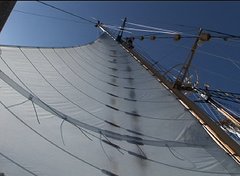“I am
assistant steward. Do not wake me up.”
I clipped
the sign in front of my bunk before I went to sleep. Since coming aboard, alarm
clocks have been abandoned by all crew members; we rely on our shipmates from
the previous watch to wake us up on time for our duties. For the night, all my
fellow C watchers were expected to report to deck or lab by 2:50 am for dawn
watch turnover. I got to sleep in until 5:30 am because it was my turn to serve
in the galley (folks ashore call it a kitchen) to help prepare the 6 meals for
the 38 of us.
“If the
sea status allows, we can make PadThai.”
Vicky, our wonderful steward, said. Although I had gotten used to the gimbled
tables, I never realized that what we were able to cook was also affected by
the sea. In so many aspects, life aboard is somehow different from that ashore.
You yell out “knife coming across” whenever you take a knife to the cutting
board; you secure bowls and tomatoes and everything that tends to roll easily when
you hear “galley, we are gybing.” The rolling sea does bring challenges that we
never had to think about ashore, both in daily routines like cooking and in
bench operations like pipetting. Meanwhile with the mentorship, support and
care from our captain and mates and faculty, we are not only taking better care
of our personal safeties but also taking up more and more responsibilities to
the operation of the ship day by day.
10 days ago,
I still could not believe it as I held the helm in hand steering a 135 foot
ship. Today, I was shadowing our 2nd Mate Scott and discussing when
and how to heave to for a science station, and calling out the commands for
striking the Jib sail. And yes, 10 days later, every one of our classmates-21 students, will have the
chance to serve as a Junior Watch Officer and report directly to the Captain.
As Captain Pamela says, our learning has been exponential. From cooking to
steering, from deploying the science Carousel to cleaning the heads (folks
ashore call it a bathroom), each and all of us take up our own responsibilities
to the ship, and the rotation watch system makes us feel comfortable doing any
of the above, at any time needed in the 24 hours of a day. We choose to make
the efforts because we love our Mama Robby C.; we chose to come aboard because
we love the ocean. For us, the best reward for 6 hours’ hard work in the lab is
a complete set of scientific data, and the best retreat for our sweats hauling
away the sail lines at 5:00 am is the gorgeous sunrise that follows.
At the
very moment, I am sitting above the doghouse, enjoying the surrounding big blue
ocean. I would like to take some time to appreciate the innumerous efforts made
by the professional crew and scientists. When all of our attention is drawn to
learning the detailed techniques of making fast a line or filtering water
samples for chlorophyll a measurement, it is them keeping track of the bigger
picture of where we are heading to. And as we learn, it is their mentorship and
encouragements that have got us so far, in terms of the learning process as
well as the geographic position. Like magic, in the middle of nowhere, tomorrow
we will find Malden Island.
A boobie
just flew by.
Yuan


2 comments:
doghouse?
You ALL write so engagingly! I love reading about your experiences above and below deck, and in the water -- and it was so cool to see the bird's (drone's) eye view of the ship and Caroline Atoll. I'm glad you've settled into the rhythms of life at sea. Keep these fantastic accounts and insights coming!
Post a Comment